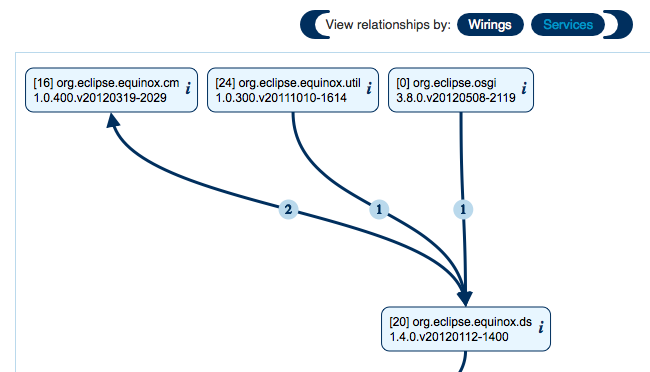Several people have asked about us providing a packaging of Virgo that includes the OSGi HttpService. We don’t have any plans to do so because it’s so easy to extend Virgo with extra function yourself. I’m using the Equinox HttpService as the desired extra function here but the same approach applies no matter what you want to extend Virgo with.
 All you need is the latest Virgo Kernel download, the Equinox HttpServer jar and it’s dependency the Servlet API jar. Unzip the Kernel and copy the two jars in to one of the repos. You have a choice of ‘repository/ext’ or ‘repository/usr’.
All you need is the latest Virgo Kernel download, the Equinox HttpServer jar and it’s dependency the Servlet API jar. Unzip the Kernel and copy the two jars in to one of the repos. You have a choice of ‘repository/ext’ or ‘repository/usr’.
In this case ‘ext’ is the better choice as these bundles are being used to extend the core functionality of Virgo. If they were dependencies of an application then ‘usr’ would be the better choice.
There are two configuration files to edit.
- The ‘config/org.eclipse.virgo.kernel.userregion.properties’ file. At the very bottom, specify an additional initial artifact. The artifacts listed here will be started before any applications are installed. We need to list the Equinox HttpService bundle. The value is comma separated so after adding the new bundle you should have something like.
initialArtifacts =
repository:plan/org.eclipse.virgo.kernel.userregion.springdm,
repository:bundle/org.eclipse.equinox.http
- The HttpService requires some configuration itself, it needs to know which port to run on. This is given with the ‘org.osgi.service.http.port’ property and can be specified in the ‘lib/org.eclipse.virgo.kernel.launch.properties’ file.
org.osgi.service.http.port=8080
That’s all there is to it, start the kernel up and before any applications are installed the HttpService will be available. This is the same approach that should be used to extend Virgo in any other way and is exactly how the Tomcat and Jetty packages of Virgo are constructed. If you have extended Virgo in some way, let us know.





 All you need is the latest Virgo Kernel download, the Equinox HttpServer jar and it’s dependency the Servlet API jar. Unzip the Kernel and copy the two jars in to one of the repos. You have a choice of ‘repository/ext’ or ‘repository/usr’.
All you need is the latest Virgo Kernel download, the Equinox HttpServer jar and it’s dependency the Servlet API jar. Unzip the Kernel and copy the two jars in to one of the repos. You have a choice of ‘repository/ext’ or ‘repository/usr’.